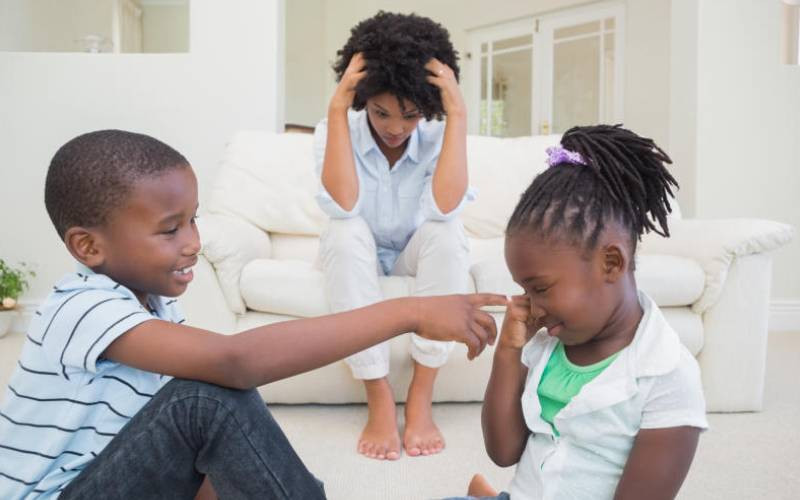
Rosemary got instantly suspicious when her five-year-old started acting weird if he mistakenly bumped into a naked person. This ‘funny’ behaviour, she says, startled her.
But she is a mother; her instincts screamed that something was seriously amiss. She suspects that the nanny – who she relieved of her duties for generally lacking proper behaviour – could have exposed her son to sex.
The threat of a child getting exposed to sex [or sexual material] gets real by the day. In a fast-paced world pervaded by images from far and wide; where anything is available at the touch of a button; it is becoming difficult to cushion children from the blitzkrieg of sexual material.
Jane, a mother with a son, rues the moment she found out that the little boy who espoused her whole existence had been exposed to pornographic content by the house girl she had hired to care for him.
“It was the lowest point in my life,” she says. “It broke my heart as a mother.”
That discovery changed her. Rules of engagement with a nanny in the house also changed.
“From that point onwards, I bath my son. I can’t allow anyone else – not in the least the nanny – to touch him. If I am not available it will have to wait. Every adult in the house can only change clothes behind closed doors,” she says.
Trizzer Kimani has handled hundreds of nannies professionally. She is the MD of Nani Employee Leasing, a company registered in Kenya.

“I applaud Jane for taking such steps,” Trizzer says. “Parents forget that a nanny is not an equivalent to take over their role as parents. Don’t relent at nurturing and raising your child. Bath your child – don’t let anybody else do that.”
Don’t release the reins of parenting, Trizzer offers. It is impossible, she says, to detect ‘good’ nannies at face value. It is a point that she can’t stress enough, saying, “Since it is practically difficult to sift through human beings for a nanny who won’t abuse your child, it is for you, the parent, to set rules and be watchful of how your child grows.”
A recent trend of parents installing cameras inside the house – to spy on the help back home – has led to a flurry of discoveries. Colloquially referred to as nanny cams, these cameras capture in detail mistreatment and every oddity that a child is exposed to.
What if you don’t have a nanny cam: how do you find out that your child has been introduced to sexuality at such a nascent age?
“A mother worth her salt will be able to tell that their child is going through something sinister,” says Catherine Mbau, a counselling psychologist.
Children, Mbau says, will often act it out. If a parent is keen they will be able to isolate proof by just studying their child’s behaviour – around other children, around adults, even while playing with toys.
“If they act out a lot of sex – it is a danger sign. If they develop extremely low self-esteem – it is a danger sign. If they appear frightened when touched – that is a danger sign,” Mbau points out.
It is a traumatising diagnosis, Adelaide says. The mother of three cannot hide her frustration and shame every time her son, the youngest of the three, mounted female guests who visited and performed a mischievous wiggle.
“How is a mother supposed to feel when your four-year-old performs sexual acts on her friends and customers,” she asks, exasperated.
She laments: “All that flooded my mind is where he learnt it; how he learnt it; who was behind it – was it me and his father?”
It never escapes Adelaide – the vexation that tightened her chest and paralysed her with emptiness every time the young man jumped onto a female. All she could do, she says, is “pray and monitor him closely around people.” She however knew that she could only immobilise him [grab his arm and not let go] for so long.
To pray and police a child around is detrimental and not helpful, Mbau says.
“The first thing a parent ought to do is report to the police. It is a criminal offence captured in the Sexual Offences Act to expose a child to sex like that,” she says.
It should not end there though. A child who has been indecently exposed to sex needs play therapy, Mbau says. Therapy, she adds, will require a minimum of eight sessions and may closely involve parents of the child as well.
It would also be proper to take the child for assessment – both mental and physical. So that if the child has been exposed to venereal diseases treatment is administered appropriately.
“Parents should not take it lightly when their child is exposed to sex at such early ages. This could affect them as they grow into teenagers and even in their adult lives. There is proof that such exposure could contribute in pervasiveness, psychopathy, and sexual addictions. It could also go as far as shaping a child’s sexual orientation.
What is lamentable, Mbau says, is the nonchalant reaction by parents; those who feign ignorance and end up spanking the child for ‘misbehaving’ sexually.
“It is wrong to punish a child because they are acting sexually,” she says. “A parent should be interested in unearthing the source of such behaviour first.”
Early exposure of a child (even toddlers) to sexual material will affect a child’s growth, says Prof Philomena Ndambuki of Kenyatta University. Ndambuki, an Educational and Child psychologist admonishes that children are curious beings that can only be offered knowledge about sex through moderate and age appropriate discussions.
“It could have very bad ramifications,” she says, “ramifications that could return to haunt the child in their future.”
Children, she insists, should only be fed with information regarding sex to fill gaps that appear as they grow: to answer their questions with subtle answers that suit their age.
Moreover, such knowledge should only be dispensed by a parent or a trusted personality like a teacher or a relative.
Proper sex education for children Children are a curious lot. That however does not mean that they can consent for sexual activity of any nature.
The sexual offences Act states in clear terms that a minor should not be exposed to sex. Parents, naturally, should strive to protect their children from any negative materials. As such, Prof Ndambuki believes that parents should take the leading role in making sure that the only sexuality their child is exposed to is what they [parents] have addressed with their children.
Even so, toddlers, Catherine Mbau says, should not be exposed to sex. It is criminal, she says, and a bad precedent.
‘Birds and bees’ are appropriate for adolescents but not for toddlers: not when they can barely make out what sex is in the first place.
Mbau advises parents to be even keener in the age of lurid digital television content from the comfort of home.
“The nanny does not have to tangibly expose a child to sex; they may tune to a TV station with explicit content or log into a pornographic website. Such images shape how a child behaves,” she says.
It is imperative, she says, that a parent sets up guidelines for digital content. That would include the type of content; the time for viewing such content; the nature of the content.
 The Standard Group Plc is a multi-media organization with investments in media platforms spanning newspaper print
operations, television, radio broadcasting, digital and online services. The Standard Group is recognized as a
leading multi-media house in Kenya with a key influence in matters of national and international interest.
The Standard Group Plc is a multi-media organization with investments in media platforms spanning newspaper print
operations, television, radio broadcasting, digital and online services. The Standard Group is recognized as a
leading multi-media house in Kenya with a key influence in matters of national and international interest.










